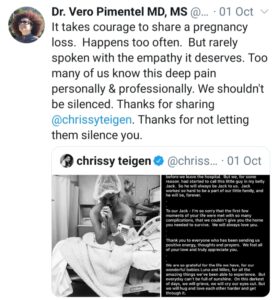Dear Dr. Vero,
There has been a lot of talk about Chrissy Teigen sharing her pregnancy loss on social media. It seems that pregnancy loss is a topic that makes people very uncomfortable. I imagine that as a high-risk obstetrician you take care of many patients who have lost their babies. How do you deal with such a loss?
A concerned reader

Dear Concerned Reader,
There are few cries that pierce one’s soul like that of a parent who has lost a child, born or unborn. I wrote a Twitter post about the pain and grief that Chrissy Teigen and too many other women have endured. I have had the privilege and misfortune of witnessing this gut-wrenching grief several times with my patients. It is a grief I have also felt in my personal life. The experience of my own miscarriage has given me a unique perspective and much deeper empathy for my patients. As a woman and a mother, I recognize, empathize with and support women who have experienced a pregnancy loss, even though their losses hurt me profoundly. Often, it is more challenging to know how to support their male partners because men tend to express their grief quite differently. Physicians must develop healthy ways to deal with losses so they can keep providing the care and support patients, and often partners, need. One of the ways I cope with loss and pain is by writing. Below is an essay I wrote examining how a cis couple, and specifically the male partner, dealt with the immediate loss of an unborn baby.
Stay safe,
No Further Words Needed
“I am so sorry!” I said to her. Before I spoke the words, her face revealed that she knew the news was not good. She shifted on the ultrasound bed. She had heard the “pop” at home and immediately felt the wetness on her underwear. As she stepped into the bathroom to confirm her fears, she felt her pants gluing themselves to her tights. She knew she had ruptured her membranes. Yet, a small part of her had hoped, no had prayed, that it was urine and not amniotic fluid pouring down her legs.
Tears began falling down her face mimicking the earlier flooding of the amniotic fluid. She wished she could replace the lost fluid. Could she do that?
“Is there anything that can be done?” asked her partner. I moved my rolling chair a few inches away from the ultrasound bed and switched my gaze up to focus on him. He stood tall by the bedside in front of an empty chair. I felt his eyes scrutinizing my face in search of answers. I explained to him that unfortunately the baby was too early to survive without amniotic fluid. His facial muscles seemed to relax from anger into despair.
“This is very hard,” I acknowledged. I explained to both of them how amniotic fluid is necessary for the lungs of the baby to develop and mature. Without lungs, a baby cannot survive once he or she is born. I talked to them about the risks to both mom and baby of staying pregnant when the amniotic bag is open with no fluid inside. She nodded, understanding. He stood there motionless, confused and dejected.
“You look like you have some questions right now.” I said, hoping to encourage him to express his feelings verbally.
“I don’t understand,” he shook his head ever so slightly. “What is it that we should do now and…” he began asking.

“I need to have the baby. If I don’t have the baby soon, I can get very sick,” she cut him off. Her voice was stern and revealed her impatience. His demeanor changed immediately. Confusion turned into concern.
“No. No. I don’t want you to get sick,” he added quickly.
I again went over her risks and my treatment recommendations. He listened attentively, still towering near her. I wanted to hold his hands and tell him that it is okay to be lost. This time around, he seemed to understand and agreed with her decision to go to labor and delivery to check if her cervix was dilated. I left the room to report to her primary obstetrical team my findings and recommendations.
Back in the solitude of my office, I thought about how men often become lost during these difficult conversations, not because they are not equally smart or don’t care deeply. They often feel disempowered and awkward when the focus in on the mother and they lack the ability to make the situation better. Or do they? He may not be able to seal her amniotic sac and make it accumulate the lost fluid, but he can be by her side, offering her the type of emotional support that only a loved one can give so tenderly and unconditionally.
The next day, I visited them after she had safely delivered a tiny baby with no heartbeat. Medically, she was fine. But, I knew that she would be grieving for a long time. Her grief could become depression. I talked to her about the different ways that we could and would support her once we discharged her from the hospital. He listened quietly while holding her left hand. I asked him how he was doing. I told him that I was glad he was able to be with her and support her the entire time. I acknowledged to them that these losses are painful for both mom and dad. He shook his head ever so slightly in agreement. There was no trace of anger or despair left on his face. “Doctor, thank you for taking good care of her. And thank you for being kind.” His voice was clear and calm. He took a quiet breath in and out. Then, he looked at their locked hands. My eyes gently shifted to her face allowing me to notice the synchronicity of their breathing. No further words needed to be said.
The information contained in this article is not intended nor implied to be a substitute for professional medical advice, diagnosis, or treatment. It is provided for educational purposes only. Always seek the advice of your physician or other qualified health provider with any questions you may have regarding a medical condition.







